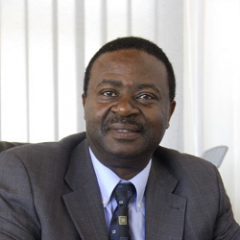GVN Center and Member Spotlight
 Pontiano Kaleebu
Pontiano Kaleebu
Director of the Uganda Virus Research Institute (UVRI) and Director of MRC/UVRI and LSHTM Uganda Research Unit
What are you and your institution currently working on regarding COVID-19?
Our institute has been the major diagnostic center for the country. UVRI was the only center testing for the first 2 months of the pandemic with the first case detected on the 21st of March 2020. Initially, we were testing few samples until our peak of nearly 3000 samples/ day. By now more than 150,000 tests have been carried out in Uganda, and about 65% of these samples have been tested at UVRI. Uganda has the highest testing rate in the region. UVRI’s other role is validation service for other laboratories. We have a governmental laboratory manual which describes these responsibilities. Further, we will provide QA/QC, and our laboratory has enrolled into the WHO QA/QC scheme. In addition, UVRI is performing the evaluation of new diagnostic tests, such as PCR and serology assays, for the country, The UVRI laboratory has also been selected by Africa CDC to be a Center of Excellence for COVID-19 testing.
We are also performing virus sequencing. For example, we completed the first sequence analysis upon the detection of the first cases. Our sequence data have been deposited into the GISAID data base. Interestingly, since most of our cases have been occurred by international travelers, the genome sequences of viruses in some cases cluster with those of viruses from the travelers of origins.
Personally, I participate in all these research programs. I also serve the Ministry of Health COVID-19 Scientific Advisory Committee and the Presidential Scientific Initiative on Epidemics Committee.
Please describe your collaboration efforts for COVID-19 with other African research institutes?
In Uganda, all the laboratories share information and reagents. We work with other laboratories at Makerere University, and The Ministry of Health Central Public Health Laboratories. We have also collaborated with other research regional institutions. For examples, for sequencing, we have worked closely with KEMRI-Wellcome Trust, in Kilifi, Kenya and have some joint research grants by assisting techniques. We are also discussing establishing joint viral transmission networks to track virus spread in the region. We have secured some funding from the European, EDCTP with plans to study the immune responses to SARS-CoV-2 by collaborating with Perinatal HIV Research Unit in South Africa. In addition, we are working on other joint applications with other African institutions.
Biosketch
The UVRI is the largest Government Research Institution in Uganda handling health research programs pertaining to human infections and disease processes associated with viral epidemiology. The UVRI also has a number of partner organizations funded by US CDC, US NIH, MRC-UK and IAVI as well as national and regional reference laboratories. The MRC Unit is one of the two MRC-UK Units outside the United Kingdom and has a multidisciplinary programs studying the HIV epidemic in rural and urban settings, emerging and re-emerging infections and non-communicable diseases. He is the head of the Pathogen Genomics, Phenotype and Immunity Programs of the Unit. The Unit became part of LSHTM in 2018.
He holds a medical degree from Makerere University and a PhD from Imperial College, London. He is a professor of immunevirology in the department of Infection Biology at the London School of Hygiene and Tropical Medicine; a Fellow of Royal College of Physicians-Edinburgh, a Fellow of Imperial College London, Faculty of Medicine and a Fellow of the Academy of Medical Sciences.
As a UVRI Director, he serves the top and senior management of the Ministry of Health. He leads a number of national and regional networks including the EDCTP East African Networks of Excellence. He is a co-Director of the African Partnership for Chronic Disease Research (APCDR); and the Uganda Medical Informatics Center (UMIC) for a computational resource offering data storage and analysis capacity. He is the chair of the national HIV drug resistance Technical working group under the Ministry of Health and a member of the National Antiretroviral Treatment committee.
UVRI’s vision is to become a world-class center of excellence in health research by conducting scientific investigations on viral and other communicable diseases by providing knowledge, policy, practice and build capacity, and by promoting institutional sustainability. UVRI provides expert advice by engaging partnerships and communication and by serving as a center for training and education. The UVRI team implements various programs with various organizations on its Entebbe Campus and other sites.
